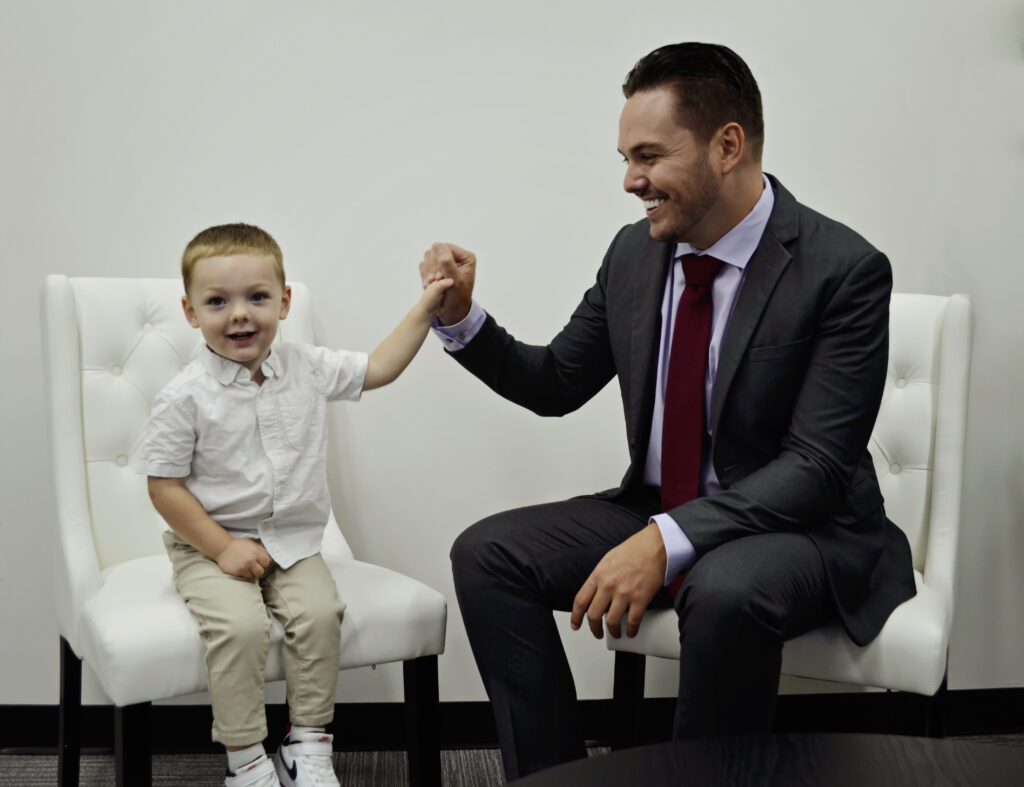Phoenix Child Custody Attorney
Parents have a fundamental right to direct the care, custody, and control of their children. Even though those rights are protected by US Supreme Court Rulings, it can feel like those rights are less protected during child custody cases. If you and your spouse cannot agree on the terms of your child custody case, a judge will ultimately decide how parenting time and decision-making rights are divided. One way you can protect your rights is by working with a top child custody attorney in Arizona.
At Desert Legal Group, our dedicated team of legal professionals is passionate about helping families navigate Arizona’s complex family law. Whether you believe your case is straightforward or complex, we are committed to guiding you at every stage of your journey as your Phoenix custody lawyers.
Legal vs Physical Custody
If you are going through a divorce or seeking custody of a biological child, your child custody lawyer will discuss two important forms of custody: legal and physical.
Legal custody refers to the legal authority to make decisions on behalf of your child and is known as “legal decision-making rights” here in Arizona. Legal custody can be assigned on a sole basis, meaning one parent has complete control over the decision-making process. More often, legal custody is joint, meaning that both parents must agree on certain issues before a decision can be made.

Examples of decisions that could require legal decision-making rights include:
- Education – Choices about where your child goes to school and what types of extracurricular activities they enroll in are often decided by the parent or parents with legal decision-making rights.
- Extracurricular Activities – Depending on the wording of your divorce decree or child custody agreement, authority to decide extracurricular activities may be given to the parent with legal decision-making rights.
- Religious Upbringing – Decisions about your child’s religious training and participation in religious activities require legal custody in Arizona.
- Healthcare – Only parents with legal decision-making rights can make decisions about medical, dental, and psychological care. Selecting doctors, managing health insurance, and consenting to treatments for your child also require this type of legal authority.
Joint legal custody or decision-making rights are common in Arizona. If both parents are present and active in their child’s life, the courts generally protect their rights to some level of legal custody over their children. The courts may award sole legal custody or decision-making rights in cases where one parent poses a risk to the child. This could be due to substance abuse, child abuse, or domestic violence, among other reasons.
One parent may voluntarily give decision-making authority to the other parent. It is important to note that this would not absolve them of child support responsibilities. If you are experiencing issues with child support payments, such as non-compliance or late payments, consult with the attorneys at Desert Legal Group.
Physical Custody
During a child custody case, the courts will determine the details surrounding physical custody. Physical custody, known as “parenting time” in Arizona, determines where your child lives. Like legal custody, physical custody can be sole or joint. With joint custody or joint parenting time, the parents may split time 50-50, or there may be one parent who has primary custody, with the other taking weekends, holidays, and summers, or one of many other arrangements. When both parents are present and active in the lives of their children, the courts like to see children spend meaningful time with both parents.

In cases where one parent does not want joint custody or poses a potential danger, the courts may award sole physical custody to the other parent. In such situations, the child’s primary residence will be with the custodial parent, who is responsible for the child’s day-to-day care.
The non-custodial parent may have restricted or no visitation rights, depending on the circumstances and the court’s assessment of the child’s best interests. This arrangement ensures the child’s safety and well-being. Sometimes, limiting contact with a parent can reduce the risk of harm to the child.
Child custody cases are often settled ahead of time, as the parents arrive at a mutually agreeable parenting plan that is presented for approval by a judge. However, disputes and disagreements may need to proceed to negotiation, mediation, or even litigation if needed.
Coming to a consensus on parenting time can initially seem like an insurmountable challenge. Naturally, both parents want to optimize their time with their children and remain involved in major decisions. In addition, there may be lingering feelings of anger or resentment that can cloud decisions that may ultimately serve the interests of both parents and children.
To help you navigate these difficult decisions, rely on the legal counsel of a child custody attorney who has guided parents through those obstacles before. The Phoenix custody lawyers at Desert Legal Group can work with your spouse’s attorney to find common ground and consensus. Complex custody cases may require the use of an outside mediator who has experience in conflict resolution.
If both parties are unable to come to an agreement on all child custody issues, a judge will decide the matter. A divorce will not be finalized until child custody matters are resolved. To prepare for trial, the child custody attorneys at Desert Legal Group will gather evidence that supports your interests and goals. The trial may include testimony from child custody professionals. If your spouse testifies, your lawyer will have the opportunity to cross-examine them and question them.
During any trial that determines child custody, it is common for both parents to testify. After both sides have had the opportunity to make their arguments and present evidence, the judge will make a ruling.
If both parents have come to a consensus on major issues, the judge’s ruling will be confined to any outstanding areas of disagreement. After issuing their final order, the divorce or child custody case will be settled. Both parents will be expected to comply with the orders.
The Role of Best Interest of the Child
Arizona’s family courts handle matters of child custody by making arrangements that are in the “best interest” of children. While judges have some leeway on how that phrase is applied to cases, the state legislature has issued guidelines that the courts must consider when deciding child custody matters.
When making decisions about which parent should be given greater legal rights over a child, a judge considers factors like:
- The past, present, and potential future relationship between both parents and the child
- The relationship between the child’s siblings, parents, and other involved persons
- How well the child is adjusted to their home, school, and community
- The wishes of the child (if they are of a suitable age)
- The mental and physical health of both parents
- The ability of either parent to co-parent
- Past misconduct of either parent
- Past incidents of domestic violence
- Whether either parent made false allegations in court
When one parent does not act in good faith during a family court hearing, those acts of misconduct may be considered by the court. Trusting a judge to make decisions about how much time a parent is allowed to spend with their child may seem like a less-than-ideal situation. Going to trial is a last resort when all other remedies for settling a case have been exhausted. Desert Legal Group’s skilled custody lawyers will work to resolve issues before they ever have to go before a judge.
Drafting a Parenting Plan
When your divorce or child custody plan is settled, you and your ex-spouse or ex-partner will follow the guidelines laid out in the parenting plan. Coming to an agreement on the details of a parenting plan can take up much, if not most, of the time that goes into settling a divorce. The child custody attorneys at Desert Legal Group will help you draft a parenting plan that guides how you and the other parent will share time with your child.
The parenting plan will detail who has the child on major holidays. The parenting plan can also include separate sections that apply to your child as they reach age milestones. Mothers with young toddlers may have concerns about splitting parenting time 50-50 at first, for example.
If both parents agree, the parenting plan may include expanding visitations for one parent as the child grows older. Any lawful arrangement can be included in the parenting plan if both parents agree to the plan.
Parenting plans can include specific guidelines. One parent may want to ensure that grandparents have the right to pick up their grandchildren from school, for example. The plans are fully customizable. Once drafted and agreed to, a judge will review the plan. If the agreement serves the children’s best interests, the judge will sign the parenting plan.
Child Custody Plan Modifications and Enforcement
Once your child custody case has been finalized, you may need to revisit the terms, make a modification, or file a request for court enforcement. Any violation of a court order is taken seriously by the court. Being found in contempt of court can lead to fines, court-ordered community service, or other penalties.
For example, if your ex fails to pay child support or to follow the visitation schedule, your attorney can bring the matter before a judge. The divorce decree or child custody order are enforceable court orders that must be followed.
Child custody modifications are sometimes needed as life situations change.

One reason you may ask the court to modify a court order is if one parent moves far away. This can make following the visitation schedule difficult, if not impossible. To account for the new situation, a judge may amend the child custody order to allow for a more sustainable visitation schedule.
Modifying a child custody order is rarely an easy task. The courts only consider modifications when there has been a substantial and material change to the living situation of either parent. Some parents may seek a modification because they regret agreeing to the terms of the divorce or child custody case. However, the courts are less concerned with the personal goals of parents and more focused on the needs and best interests of the child.
If you have experienced a change in circumstances that significantly impacts your ability to care for your child, the child custody attorneys at Desert Legal Group can help.
Child Custody FAQs
Child custody cases are complex and require comprehensive and compassionate legal counsel. The attorneys at Desert Legal Group are here to answer these and other questions that you may have as you begin the legal process of protecting your parental rights in court.
Any effort by one parent to delay a child custody case or to make a false accusation could ultimately backfire on that parent. If the matter goes before a judge, that judge could be presented with evidence that reflects poorly on that parent. An experienced child custody lawyer is skilled at handling parents who are not cooperative with the court process.
Parties can engage in collaborative law proceedings for joint matters, such as child custody determination. Resolutions reached in these negotiations involve independent lawyers. There is no tribunal intervention. The process is voluntary and requires fully informed participants. Collaborative law is ideal for parents who want to remain amicable and co-parent.
Collaborative law can be an excellent choice for couples seeking a respectful and amicable divorce process. It involves both parties and their attorneys committing to resolve all issues without going to court, focusing on open communication and cooperation. This approach often leads to more satisfactory and long-lasting solutions for both parties.
Yes, our attorneys are experienced in assisting clients with modifications to existing court orders, including child support, spousal support, and parenting plans. Life changes, and we understand the need for legal agreements to reflect those changes. We can guide you through the process of requesting a modification that better suits your current circumstances.
Arizona grandparent rights and third-party custody laws exist to ensure children have access to loving, supportive caregivers who serve their best interests. Read More
Schedule Your Child Custody Consultation Today
Child custody disputes can be emotionally draining. One way you can keep from becoming overwhelmed is by working with a law firm that understands what you are going through. At Desert Legal Group, we understand family dynamics and how they impact these crucial cases. In fact, many of our lawyers are parents themselves. The relationship between a parent and child is a fundamental bond, and protecting those rights often requires the legal counsel of an experienced lawyer.
Whether you are beginning a divorce, navigating custody hearings for unmarried parents, or seeking custody of a child you are not the parent of, the child custody lawyers at Desert Legal Group, PLLC, are here to help. Contact our firm today to schedule your initial consultation.